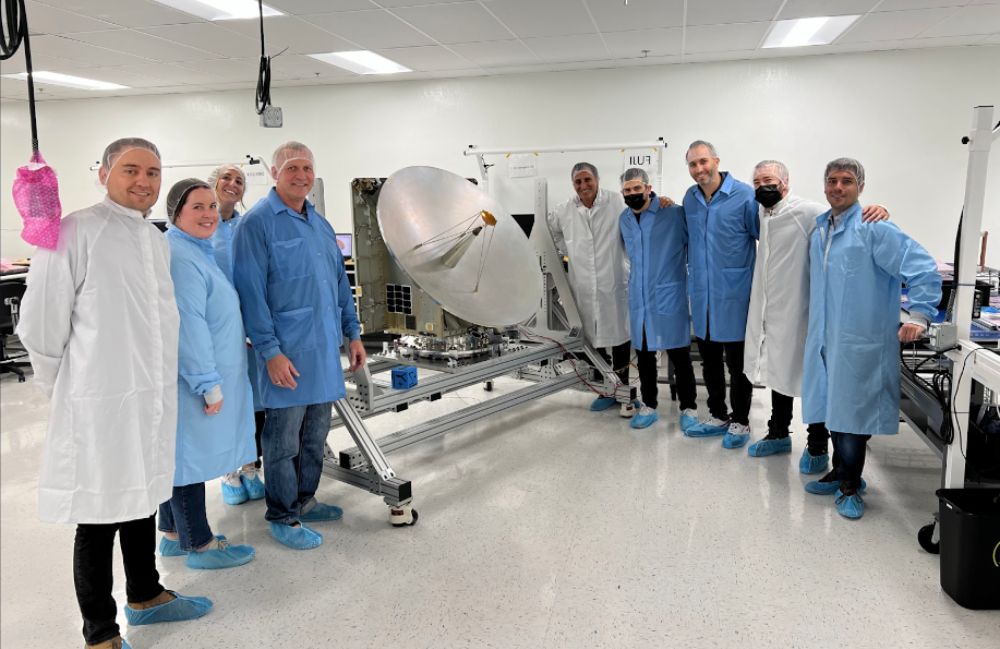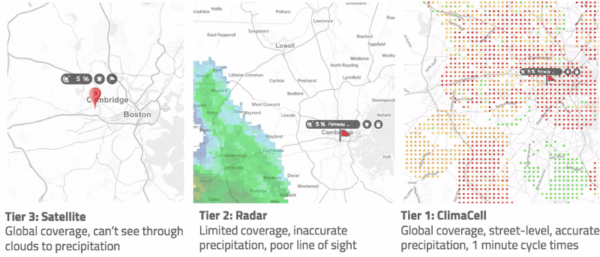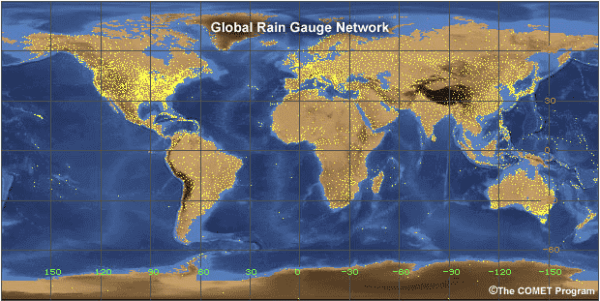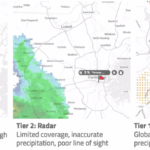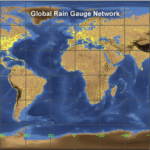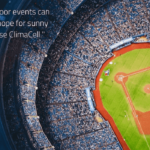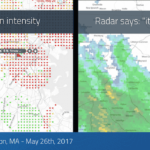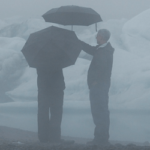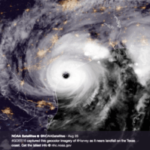At Tomorrow.io, the Space & Sensors team is pushing the boundaries of satellite hardware, advancing weather intelligence to new heights.
In August 2024, the team launched its first two microwave sounder satellites, marking a significant advancement for Tomorrow.io in transforming global weather forecasting, early warning systems, and climate resilience.
These sounder-equipped satellites mark the next phase in Tomorrow.io’s expanding constellation, aiming to provide unprecedented sub-hourly global atmospheric measurements of temperature, humidity, precipitation, and tropical cyclones—a first for the commercial sector.
Last year, the team launched the world’s first two commercially built weather radar satellites: Tomorrow-R1 and Tomorrow-R2. These two satellites are 450 km above Earth in a polar orbit and carry a Ka-band radar ideally suited for characterizing precipitation and critical ocean-surface parameters.
From the intricate radar systems they build to innovative microwave sounder technology, this team’s work is integral to our mission of expanding global weather coverage.
We recently had the chance to spotlight key members of the Space & Sensors team and learn more about contributions and the groundbreaking projects they’re spearheading.
Are you interested in how a startup builds the hardware necessary to launch satellites?
Keep reading to learn how we did it.
A Day in the Life: Meet the Space and Sensors Team at Tomorrow.io
Brad Isom, Principal Systems Engineer
Brad Isom, Tomorrow.io’s Radar Systems Lead at our Golden, Colorado office, manages a team of RF radar and test engineers.
His team focuses on three main projects:
- Launching weather satellite systems
- Supporting the NOAA P3 hurricane hunter aircraft
- And developing the versatile ARENA radar transceiver.
The ARENA transceiver, adaptable for various remote sensing applications, plays a pivotal role in airborne and spaceborne systems.
“A transceiver is a versatile radar component that includes a digital transmitter and receiver, making it adaptable to various frequencies and applications. It’s used in space, airborne systems, and submarines, covering a broad spectrum of remote sensing tasks,” says Brad.
Brad’s daily responsibilities involve leading the team as they focus on these projects and develop the transceiver, ensuring it works properly and all systems are operational.
Challenges and Excitements:
Working with a reliable team is essential to Brad, who emphasizes its importance, especially for space systems.
“We really spend a lot of time testing for both performance, but also for reliability so that once it’s launched, we’re sure we’re going to get the data quality that we want out of the system,” he says.
Their day to day ensures the reliability and performance of our satellite systems, “The most challenging thing, particularly for space, it’s very challenging because once it launches, there’s no opportunity to fix it,” he notes.
Brad’s team thrives on diverse challenges, seeing each as an opportunity for innovation.
For instance, designing systems for hurricane hunter aircraft presents exciting chances to push the boundaries of durability and reliability. These projects allow the team to showcase their expertise in creating robust systems that perform flawlessly even in extreme conditions.
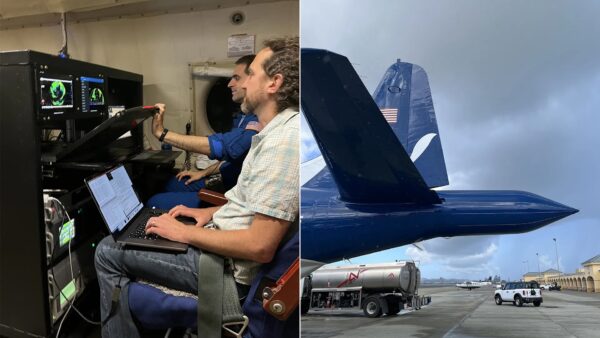
Pictured: Clayton Bjorland, Senior Radar Scientist at Tomorrow.io onboard NOAA WP-3 N42RF, during Hurricane Lee in 2023. Source: Axios
The most exciting aspect for Brad is the impact of his team’s work. “The quality and amount of data we’re going to get [from our constellation] is unprecedented,” he shares.
This data will support operational activities like the National Hurricane Center and validate satellite data, improving global weather models.
FPGA Design and Hardware Engineering Team
The FPGA Design and Hardware Engineering team at Tomorrow.io plays a crucial role in developing the complex systems that power our weather satellites.
This team focuses on:
- Designing digital systems for satellite payloads
- Troubleshooting and managing FPGA systems
- Writing firmware that enables unique capabilities for our ARENA system
- Ensuring reliability in space environments
The team’s work is integral to the ARENA SDR (Software-Defined Radar) system, which is crucial for weather signal processing. Their expertise in managing complex hardware and firmware systems allows Tomorrow.io to push the boundaries of what’s possible in satellite technology.
“Every problem is a hard problem,” notes a team member. “We’re not in the space of ‘this has been done before.’ We are really revolutionizing and figuring things out as we go, and that involves a slew of challenges.”
The technical challenges faced by this team are multifaceted, from managing interfaces and power sequencing to ensuring reliability in space. Their innovative solutions often require balancing cost, development time, and reliability, especially when dealing with the effects of radiation on hardware in space environments.
Emma Watson, Systems Engineer, Microwave Sounding
Emma Watson is a Systems Engineer at Tomorrow.io.
As a subject matter expert for microwave-sounding payloads and spacecraft, she ensures the accuracy and reliability of these highly sensitive instruments designed to capture temperature and humidity profiles.
These payloads are essential for our nowcasting efforts, providing real-time weather data.
“I work primarily on our microwave sounding program. And what I do day-to-day is manage the build of our payload,” says Emma.
In her role, Emma is the Subject Matter Expert (SME):
- Overseeing the development of microwave-sounding payloads
- Ensuring data accuracy for weather forecasting
- Managing the unique challenges of each payload
- Communicating across teams to ensure needs are met
What is a Microwave Sounder?
Microwave sounders technology was initially developed in the 1960s and has made significant advancements over the decades.
These instruments are crucial for measuring temperature and humidity profiles, essential for accurate weather forecasting.
“What we’re doing at Tomorrow.io that is revolutionary is we’re creating a constellation of these,” says Emma.
This ambitious project will launch up to 18 satellites into orbit, effectively doubling the current number of TROPICS sounders on orbit in space. This expansion will greatly enhance our ability to gather detailed atmospheric data, improving our nowcasting capabilities and overall weather prediction accuracy.
Unique Challenges of Systems Engineering
As a Systems Engineer, Emma faces unique challenges, saying, “Microwave sounders are highly sensitive instruments designed to capture temperature and humidity profiles. Each payload is like a unique little snowflake, with its quirks and challenges.”
“These are highly sensitive receivers, they’re passive, which is the one thing that’s different between our active TRAKR [radar]program and the microwave sounding program is that we are passive. So we are just trying to look at the earth. We are receiving temperature and humidity information just by looking at it.”
The complex nature of RF engineering often feels like “black magic,” with each payload exhibiting distinct quirks.
One significant challenge Emma has faced was addressing noise in one of the payload channels. She explains how with each challenge, her team will approach problem-solving differently.
With this payload issue, she collaborated across teams with a teammate on the radar side to reach a solution, “We found that the noise was due to environmental EMI. We built a Faraday cage around it to block out the noise, which solved the issue,” she explains.
Impact and Intuition:
Emma finds great motivation in the global impact of her work. “Our data is going to be critical in fulfilling our mission of global coverage,” she says, “Talking with our science team gets me excited, they help me look at the bigger picture.”
Despite the technical challenges, the opportunity to contribute to a mission with such far-reaching implications is a significant driver for Emma.
She values the close interaction with internal customers, like weather scientists and meteorologists, allowing her to see the direct impact of her work.
Mission Operations Team
The Mission Operations team at Tomorrow.io is responsible for ensuring that our satellites in orbit are functioning correctly and communicating effectively with ground stations. Their primary focus areas include:
- Ensuring satellite health and communication
- Testing satellite operations on ground-based systems
- Generating and verifying satellite schedules
The team works with a ground-based system called a “flatsat,” which mimics our on-orbit satellites for testing purposes. This allows them to test operations on the ground before sending commands to space, ensuring everything works as expected.
“Being a mission operations engineer is kind of like managing the uptime of an app,” explains a team member. “Just like our satellites, they need to be operational. So we constantly are making sure our satellites are functioning and they’re operating as we expect.”
The day-to-day work of the Mission Operations team varies significantly, reflecting the dynamic nature of working on satellites at a startup. Their responsibilities include:
- Generating schedules that define the tasks the satellite needs to execute
- Directing the satellite to scan the Earth and downlink collected weather data
- Ensuring overall satellite health through continuous monitoring and data exchange
The team’s work is crucial in providing weather security for the globe, especially for regions that previously lacked reliable weather data.
ARENA Systems Engineering Team
The ARENA Systems Engineering team at Tomorrow.io is responsible for developing and maintaining the ARENA system, a software-defined radar system that’s highly flexible and configurable. This team:
- Develops hardware for scientific missions
- Ensures hardware reliability in space environments
- Collaborates with external customers, including NASA and defense contractors
ARENA is used for various missions, including scientific and defense applications. Its high-performance hardware and adaptability make it an essential component for both internal and external customers.
The team’s day-to-day activities involve:
- Cross-collaboration with software, firmware, and hardware engineers
- Customer engagement to refine requirements, conduct reviews, and provide ongoing support
- Hands-on work with ARENA systems for development, testing, and debugging
- Architecting future ARENA designs to determine the technology roadmap
The precision engineering and problem-solving skills of this team are critical in addressing complex hardware challenges. They often work on modifying firmware to ensure precise timing signals and use advanced tools like logic analyzers to maintain exacting standards.
What is ARENA?
Arena is a software-defined radar system, very flexible and configurable, used for various missions, including scientific and defense applications. Its high-performance hardware and adaptability make it an essential component for our customers.
Contributions to Tomorrow.io’s Mission
Each member of the Space & Sensors team contributes uniquely to Tomorrow.io’s mission of revolutionizing weather intelligence. Their work ensures high data quality, which is essential for accurate weather forecasting and modeling.
From Brad’s focus on reliability and data quality to innovative hardware solutions, Emma’s intuition-driven calibrations, and precise engineering, the team’s collective efforts drive our mission forward.
Why Tomorrow.io Stands Out
Innovation and Ownership
Tomorrow.io offers an environment where innovation thrives, and ownership is encouraged. Employees are given the autonomy to tackle complex problems and see projects through from inception to completion. This sense of ownership is a significant draw for top talent, allowing individuals to make substantial contributions and see the impact of their work.
Fast-Paced and Collaborative
The company’s fast-paced, collaborative environment contrasts with the slower, more segmented processes of larger companies. Employees at Tomorrow.io experience the full lifecycle of projects, gaining diverse skills and insights along the way.
Global Impact
Perhaps the most compelling aspect of working at Tomorrow.io is the global impact. The data collected and processed by the hardware developed by the Space & Sensors team has far-reaching implications, from improving daily weather forecasts to aiding in disaster preparedness and response.
The Future of Hardware at Tomorrow.io
Tomorrow.io’s Space & Sensors team is at the forefront of revolutionizing satellite hardware, driving advancements in weather intelligence. The dedication and expertise of team members like Brad, Kodie, Emma, Sophia, and Frank are instrumental in achieving our mission.
Their work pushes the boundaries of technology and makes a tangible difference in weather forecasting and global weather intelligence.
For those looking to make an impact in the field of aerospace and hardware engineering, Tomorrow.io offers a unique and rewarding opportunity.
If you’re inspired by the groundbreaking work of our team and want to be part of pushing the boundaries of weather technology, we have exciting news:
Our Space & Sensors team is growing!
Tomorrow.io is hiring across our team and has positions open for radar systems, embedded software, hardware design, operations software, and software engineers!
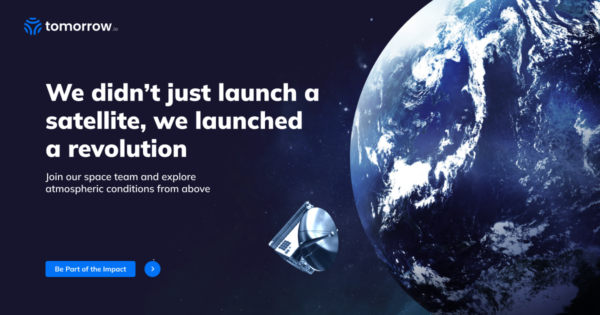
Tomorrow.io is hiring! Join the revolution today.

